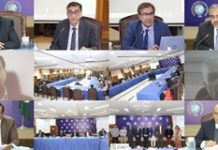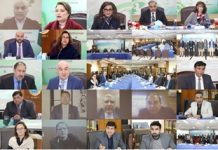Perhaps the regime thought that it was acceptable to take a hit politically and deport Sharif, instead of facing him in the streets of Pakistan, where he could pull crowds and pose a serious threat to the emerging, liberal alliance between the PPP and Musharraf
President Pervez Musharraf’s regime has been passing through rough waters since his fateful decision earlier this year to suspend the Chief Justice of the Supreme Court backfired. There were hardly any predictions of political trouble before Musharraf’s unsuccessful attempt at sidelining the judiciary. However, the political landscape of the country has changed following a mass movement led by the lawyers and the eventual restoration of the embattled chief justice.
There are three important changes that will have a strong bearing on political developments in the coming weeks and months. First is the fact that the judiciary seems to be acting as a truly autonomous institution of the state, no longer subordinate to the political interests of the executive branch. This might be considered as a defining and momentous transformation of the role of judiciary and will likely have far-reaching effects on the political system.
A second corresponding change that the judicial crisis brought onto the political scene was a weakening of Musharraf’s grip on power. He lost the moral high ground he tried to claim by accusing leaders of mainstream political parties of corruption and ineptitude. His political manoeuvring and deal-making is in the mould of traditional feudal politics.
Nothing demonstrates his significantly weakened political position more than the manner in which he has approached Benazir Bhutto to work out an arrangement for his political survival. Obviously, the elements he has been patronising for the past eight years lack political support and credibility to get him elected and provide him enough support to continue in office for the next five years. To achieve this objective, he began negotiations with the Pakistan People’s Party since it is an authentic mass party with a large support base.
Third, judicial activism and general perception that Musharraf and his team have lost popular backing, if there was any, has encouraged Nawaz Sharif to take a confrontational line. With declining social capacity and influence of the regime, Sharif saw a political opening which could possibly be used to rehabilitate his image. The scenario encouraged him to return to Pakistan even if it meant violating an undertaking that he would stay out of the country for ten years. While the undertaking may have a moral connotation, it hardly affects his constitutional rights as a citizen.
However, politicians think and act according to their political interests, and seldom are they bound by undertakings as ambiguous as the one Sharif signed while serving time in prison. His return yesterday was a bold political statement showing his resolve to remain a central figure in the political drama of Pakistan in the run-up to the presidential and general elections. If he had not taken this well-calculated risk, he would have lost credibility with his party workers as well as the people of Pakistan at large. His attempt to return to Pakistan was a politically sound decision.
No one was under any illusions that Sharif’s return would be smooth and that he would be left free to lead rallies on the streets of the country. Government functionaries had speculated arrest, imprisonment and reviving old charges against Sharif as options to counter him upon arrival. Perhaps PMLN leaders were prepared to take the matter of his arrest to the courts, confident that Sharif would get some relief. Rather, the government decided to deport him to Saudi Arabia, apparently to complete the remaining period of his undertaking or agreement.
How will bundling up and deporting the former prime minister affect the political process and political alignments in the country?
First, it shows a great deal of desperation and insecurity on the part of the Musharraf regime. It seems to have diminished its good will and political capital to face a seemingly popular political leader. The regime perhaps could not maintain political cohesion among the ranks of its coalition partners who had, in earnest, started exploring the possibility of rejoining Sharif’s PMLN.
Perhaps the regime thought that it was acceptable to take a hit politically and deport Sharif, instead of facing him in the streets of Pakistan, where he could pull crowds and pose a serious threat to the emerging, so-called liberal alliance between the Pakistan People’s Party and the Musharraf regime.
But this political respite might prove to be temporary and contains within it dangerous trends for the future politics of Pakistan. The whole deportation affair gives an ugly look to the politics of the country and may have serious legal and political ramifications. The legal ramifications may relate to disrespecting decisions of the Supreme Court in letter and spirit. The government might come up with legal justification of its own, but even a basic understanding of the law makes it clear that the government has transgressed normal standards of law and politics. It is quite possible that we might see a fresh confrontation between the government and the judiciary on this issue.
With Sharif safely away in Saudi Arabia, the ground is paved for the deal between Musharraf and Bhutto. It is not without reason that Bhutto stated that she “is more popular than Nawaz Sharif” and that she “will win elections hands down” shortly after the plane carrying Sharif took off for Saudi Arabia. The new alignments that seem to be shaping up may lead the country back to old political polarisations. PMLN and other parties may gang up against the PPP, and even boycott the elections, undermining the credibility of the electoral exercise.
Political expediency of the players apart, there is also a silver lining in the alignment between Musharraf and Bhutto: the possibility of genuine transition to democratic rule in the country. This might come about if Bhutto insists on two demands; that Musharraf relinquish his office as army chief and article 58(2)B is removed from the constitution.
These concessions from Musharraf will surely help him recover the political ground he has lost and make him acceptable as a transitional figure. Such a deal will also raise the stature of Bhutto and restore her credibility as a leader working in the interest of democracy, and not for her personal interests.
Without such a legal framework, the two may fail to contain the political discontent or be able to cope effectively with the fallout of Sharif’s deportation from the political scene of changing Pakistan.
The author is a professor of Political Science at the Lahore University of Management Sciences.













